While the Samsung Galaxy S5 might be the biggest Samsung — and pretty much Android as a whole — challenger to the iPhone when it comes to outright sales, recent weeks have seen a new contender emerge from the Korean phone maker; The Samsung Galaxy Alpha.
Samsung went a little smaller — and more than a little metal — with the Galaxy Alpha. By contrast Apple went significantly bigger with the iPhone 6. And both came out at 4.7-inches. What we're left with, then, is the two biggest smartphone makers in the world launching two very closely matched devices at pretty much the same time.
So, how do they stack up against each other?
Look and feel
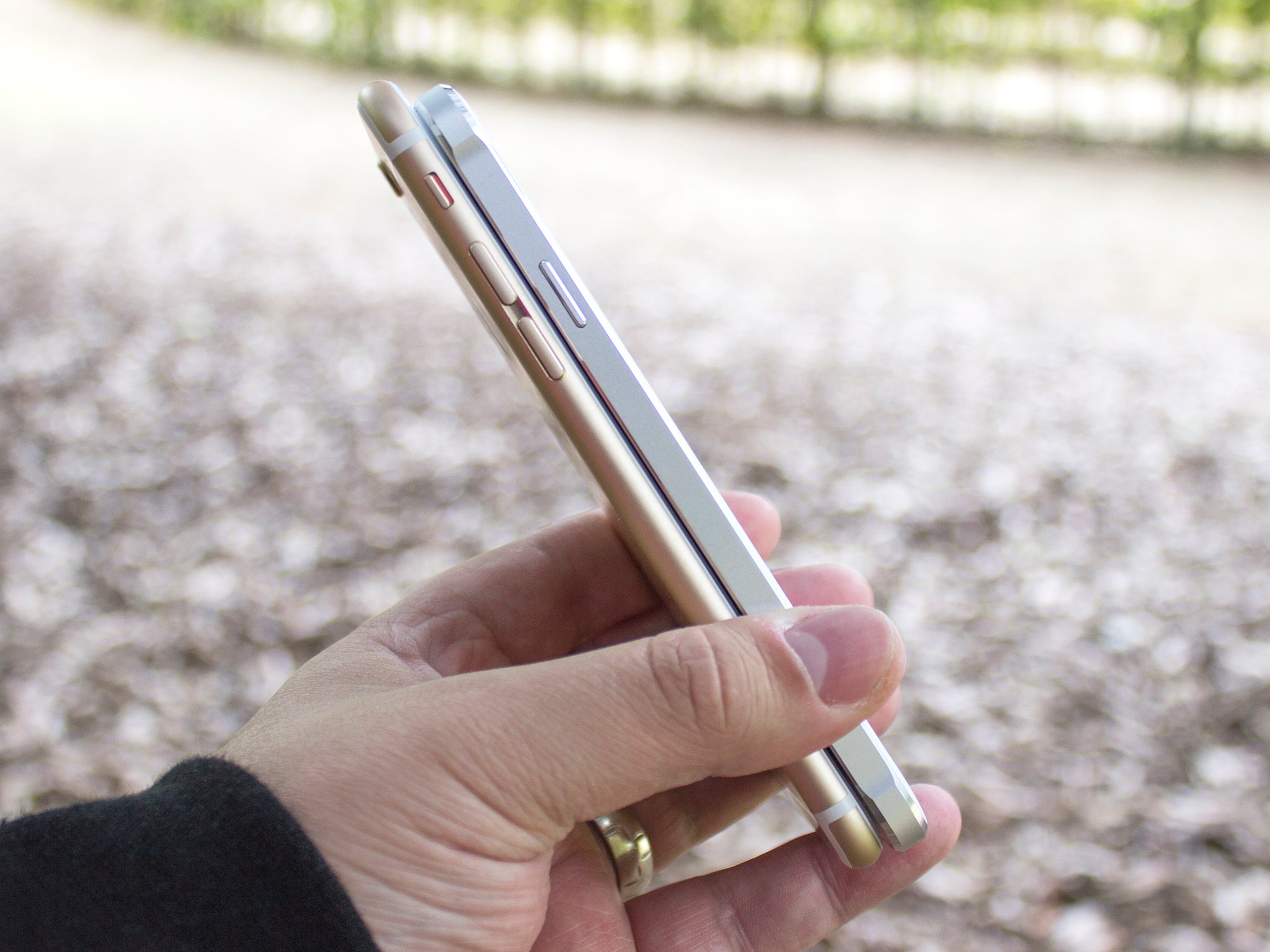
The Galaxy Alpha is instantly recognizable as a recent Samsung device — no, not just because it says Samsung on the front and back. It carries the now traditional Samsung physical home button, and from the front looks like a squared off, slimmer version of the Galaxy S5. Of course, it also set the precedent for the new Galaxy Note 4, which in turn looks a lot like a much larger Galaxy Alpha.
Visual similarities aside, the Galaxy Alpha signaled a distinct change in direction for Samsung's industrial design. Metal construction finally came to the Galaxy line, with an aluminum chassis paired with a plastic, removable back cover.
One area Samsung has a leg up for sure on the design front is the antenna.
On the visual front, the iPhone 6 is, well, it's an iPhone. From the front it looks virtually identical to its predecessor, the iPhone 5s, though now with a larger display. Where the Galaxy Alpha is only aluminum around the sides, the iPhone 6 has it back and sides. One area Samsung has a leg up for sure on the design front is the antenna, which on the iPhone 6 — perhaps worst of all on the gold model I have – is the reason for the bold white lines across the back of the phone. The Galaxy Alpha has a series of much more subtle lines through its metal edging.
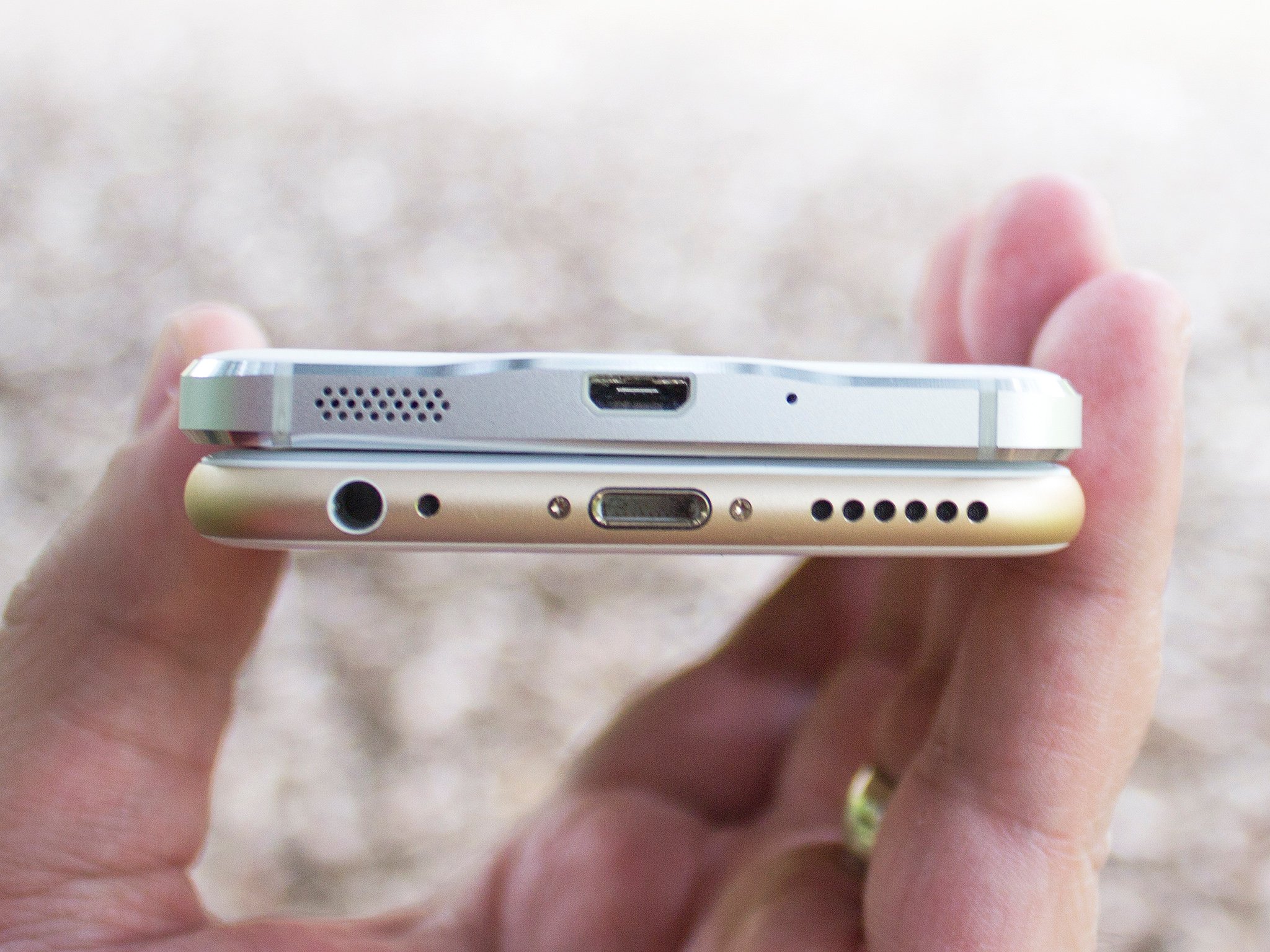
It's hard to pick a distinct winner in terms of appearance and how they feel in the hand. Much of it will come down to preference. The iPhone 6 has curved edges that the front glass rolls beautifully into, but it's certainly more slippery to handle than the Galaxy Alpha with its metal back, versus plastic with a slight texture to it. The Alpha's straight edges are more reminiscent of handling an iPhone 5s, but it wins out on outright size.
Samsung might have got it a little more right with the Galaxy Alpha.
That's because the Galaxy Alpha is shorter, slimmer and thinner than the iPhone 6 and it also weighs a little less. On paper the numbers may be small, but it does feel much more compact in the hand. Apple got it right with the iPhone 6, but Samsung might have got it a little more right with the Galaxy Alpha. Ultimately it comes down to personal taste. But the Alpha is certainly the more compact — even if marginal — and is much less slippery to hold on to.
The Specs
Specs sheets never tell the full story of any phone — least not the iPhone. But when comparing, they're absolutely important to consider. Here's a side-by-side of what each phone is packing on the hardware front.
| Category | Samsung Galaxy Alpha | iPhone 6 |
|---|---|---|
| Dimensions | 132.4 x 65.5 x 6.7 mm | 138.1 x 67 x 6.9 mm |
| Weight | 115g | 129g |
| Colors | White, Black, Gold, Blue | Space Gray, Gold, Silver |
| Display | 4.7" HD Super AMOLED (1280 x 720) | 4.7-inch 1334x750 (326ppi) IPS LED |
| CPU | Octa Core (Quad 1.8GHz + Quad 1.3GHz) | 64-bit Apple A8 |
| Platform | Android 4.4.4 with TouchWiz | iOS 8 |
| Internal Storage | 32GB | 16/64/128GB |
| RAM | 2GB | 1GB |
| Cameras | 12MP (rear) + 2.1MP (front) | 8MP ƒ/2.2 (rear) + 1.2MP (front) |
| Battery | 1,860 mAh removable | 1,810mAh non-removable |
| Sensors | Accelerometer, Gyro Sensor, Geomagnetic Sensor, Hall Sensor, Light Sensor, Proximity Sensor ,Gesture Sensor, Fingerprint Sensor, HR Sensor | Accelerometer, Ambient light, Barometer, Compass, Gyroscope, Infrared, Proximity |
Hardware and performance
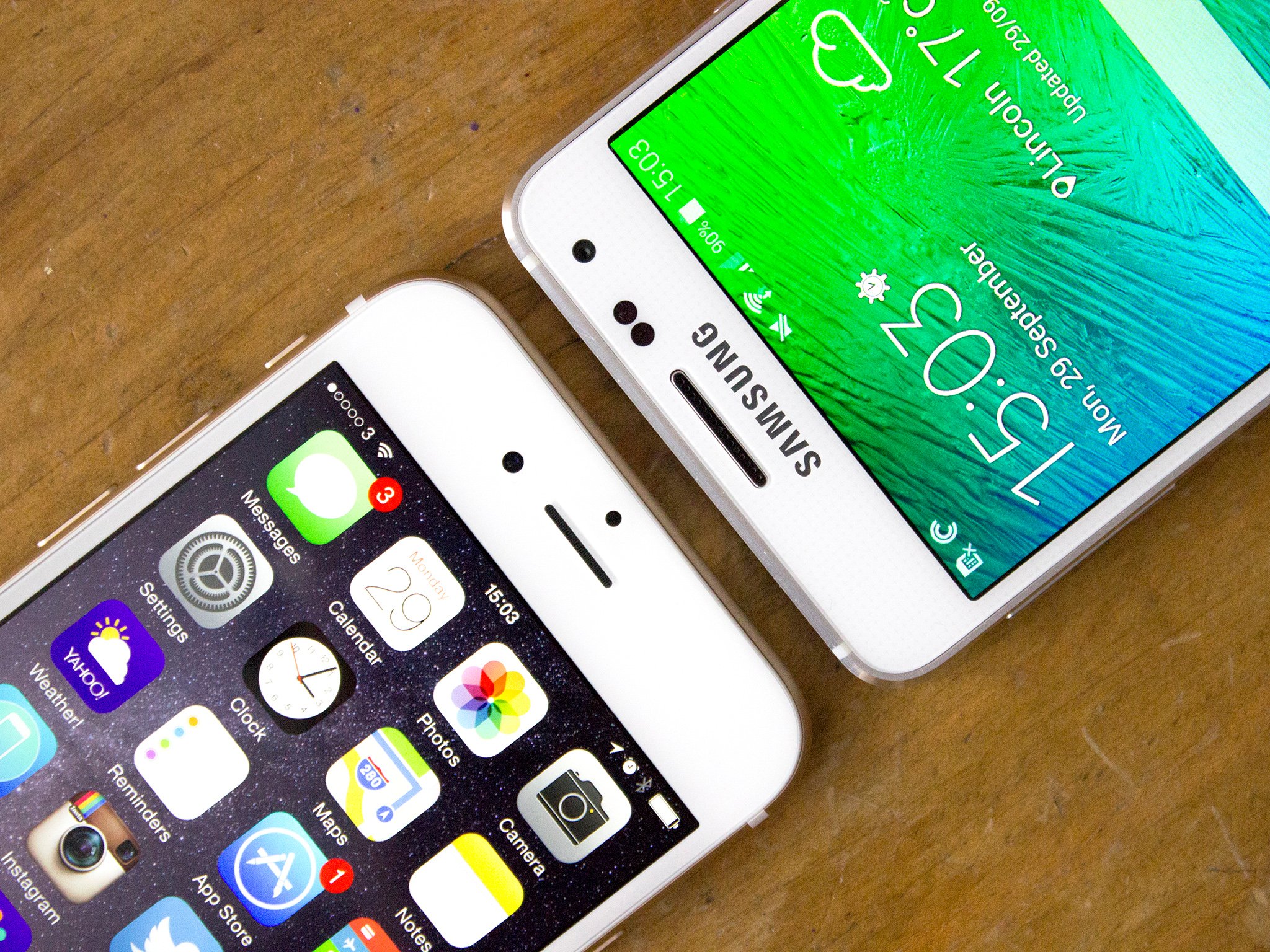
in controlling the hardware and the software you get a fantastic overall user experience
It's tough to directly compare hardware performance because the two companies take very different approaches to their devices. Apple traditionally doesn't shoehorn the absolute maximum into its iPhone releases — the 1GB of RAM in the iPhone 6 is a prime example — but in controlling the hardware and the software you get a fantastic overall user experience.
The Galaxy Alpha is no slouch, though. It's not a trimmed down, mid-range effort as is so often the case with Android manufacturers when they make devices smaller. We've got the octa-core Exynos version here backed up by 2GB of RAM.
Both phones are fast, neither struggles with extended video or gaming sessions, and overall both phones are pretty smooth in daily use. You're more likely to notice sketchy scrolling or lag inside apps on the Alpha than the iPhone, with even Google's own Google+ app showing better scrolling on the iPhone. Whatever the reasons, Apple's method of control generally seems to lend itself to smoother, less frustrating experiences. Nerds can look past that, but it might not be the same response from a nerds mom using both side-by-side in the store. Whether you like iOS or not, there's no denying that it's a smoother experience than Touchwiz on the Galaxy Alpha.
All round the iPhones display is much more natural looking
Generally both phones are well matched on hardware and performance. But there's one striking difference; the display. While both are the same size and almost the same resolution — Apple went a little over 720p for its Retina Display for reasons of its own choosing — when it comes to how they look they're quite different. The Super AMOLED display on the Galaxy Alpha has much deeper, nicer looking blacks, but colors are more saturated and whites just, well, they're not really white. The sight blueish tinge is pretty noticeable when looking at it side-by-side with the iPhone 6. All around the iPhone's display is much more natural looking.
The software
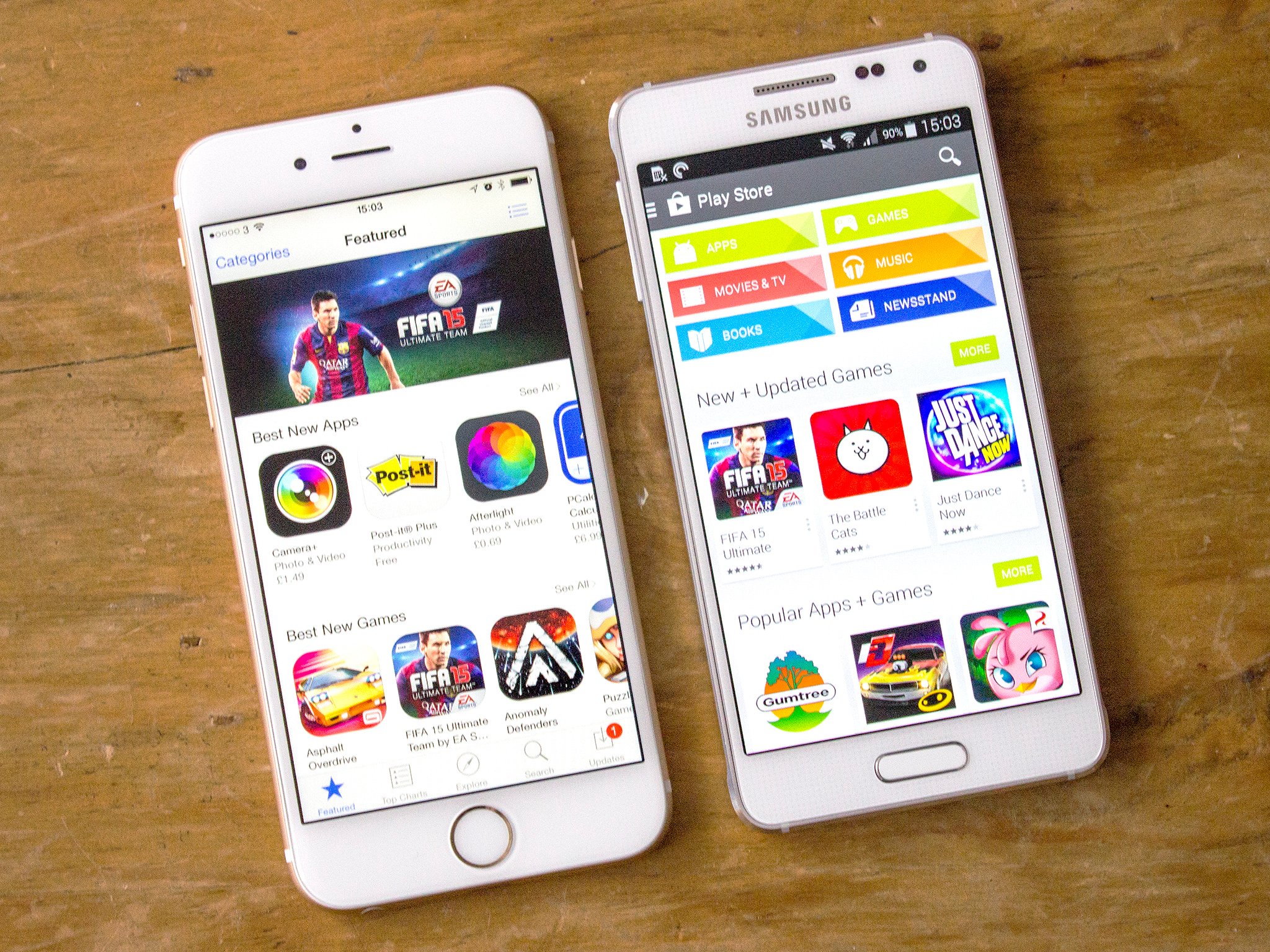
The biggest difference between the two phones and ultimately what could prove the difference maker in which you'd choose. The Galaxy Alpha runs the latest version of Android, 4.4.4 KitKat, as well as the latest version of Touchwiz. The iPhone 6 of course launched running iOS 8.
Apple makes, well, Beats Music for Android
The content ecosystems are virtually a dead heat these days, with the Google Play Store offering pretty much all the apps, movies, music, TV shows and books that the iTunes Store does. Theres one key difference, however. It's much easier to be a Google customer on iOS than it is an Apple customer on Android. Google makes some fine apps for iOS, while Apple makes, well, Beats Music for Android.
iOS 8 now also offers many of the features Android users have been familiar with for a long time, such as sharing between apps, custom keyboards and widgets — sort of. On the platform front it comes down to what you, the phone buyer, prefers. This isn't the time or place to go into every little comparison. Each has its pros and cons, but it's your decision which of each you choose to live with.
The cameras
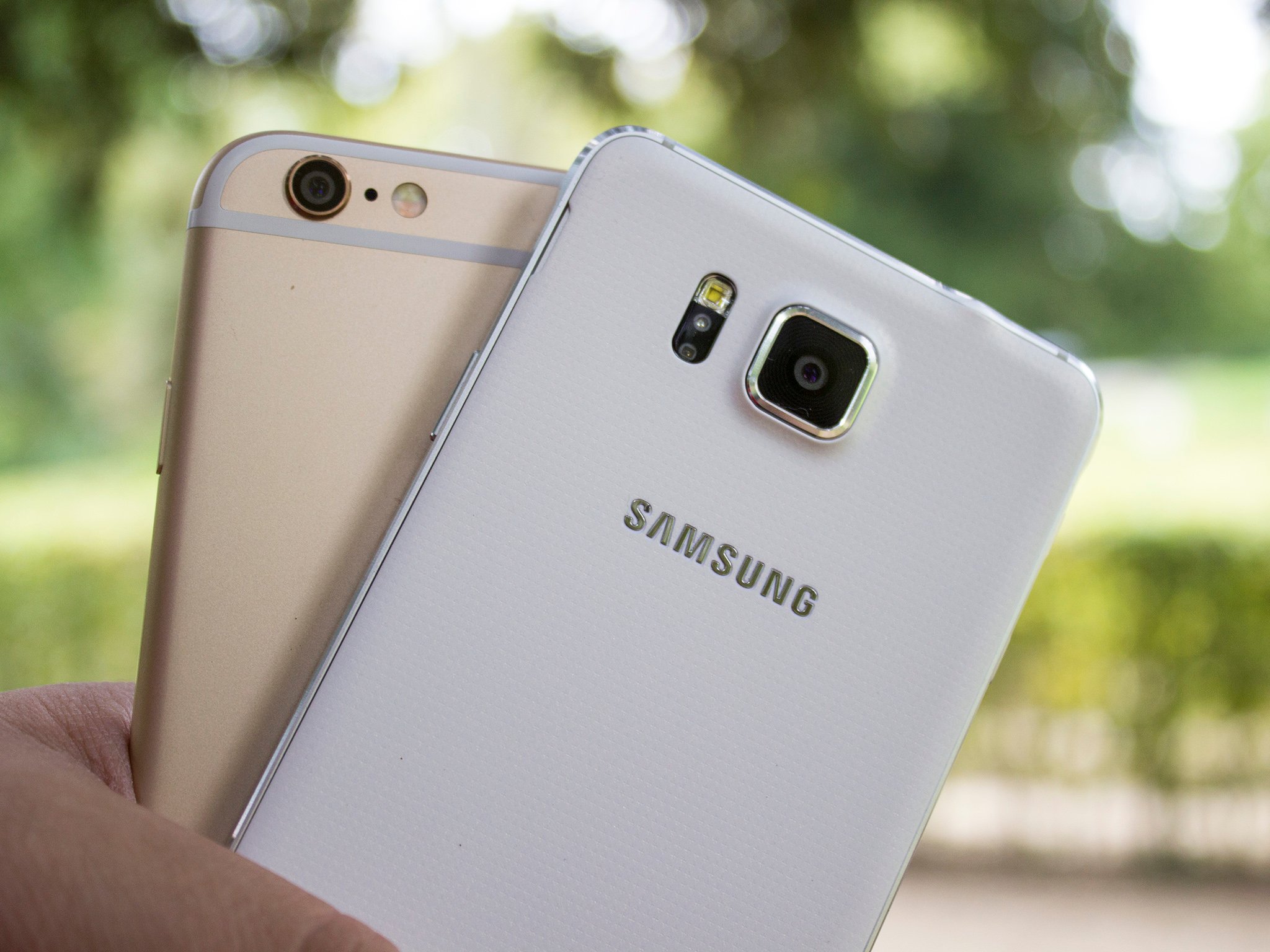
The iPhone has traditionally attracted much positive attention for its camera, and not without merit. Samsung, too, has been known to have some pretty strong cameras, albeit often dependent on the conditions you're shooting in – remember the Galaxy S5 in low light?
The Galaxy Alpha is close, but it's just not as fast.
The Galaxy Alpha has a 12MP rear camera to the iPhone 6's 8MP, and both protrude from their respective devices. Apple's stock camera application has less overall options than that on the Galaxy Alpha, but still covers all the main bases. Where the iPhone has a leg up is outright speed. It's still one of, if not the fastest cameras on a smartphone when it comes to picking it up and quickly shooting good quality images. The Galaxy Alpha is close, but it's just not as fast.
Ultimately it comes down to which takes better pictures. So here's a few comparisons shot by each phone. All images were taken at the highest resolution possible, though they've been compressed to 2048 pixels wide for the purposes of publishing. The Galaxy Alpha shots are 16:9 while the iPhone 6 are at 4:3. HDR was turned off for all.
The iPhone 6 is certainly better under low light conditions, even without OIS that its bigger brother, the iPhone 6 Plus, has. Apple's doing a lot right with its software. Samsung has its own version of software stabilization but it's honestly not as good, takes longer to do its thing — you have to hold the phone completely still until it finishes — and images shot using it look noisy and over processed. They come out brighter than the iPhone, but brighter isn't always better.
In good light though things are a lot more even. The iPhone 6 seems to shoot with higher saturation, though under good light both shoot good quality, bright and sharp images. Neither really disappoints. One thing that is worth noting is that the iPhone 6 was much faster to lock onto and shoot the close up of the yellow flower. It was moving in the breeze, but the Alpha did struggle a little more in taking that image.
It's tough not to think the iPhone 6 is a better all rounder, though.
There are some scenarios that the iPhone is a clear winner, such as low light, focusing and shooting speed, and in some shots it does better at creating a more accurate representation of the scene. But, Samsung has continued with the strengths of the Galaxy S5 camera — in brighter light it's arguable you're getting better pictures than the iPhone – and a lot of the time you're going to shoot some very satisfying images. It is tough not to think the iPhone 6 is a better all rounder, though.
The bottom line
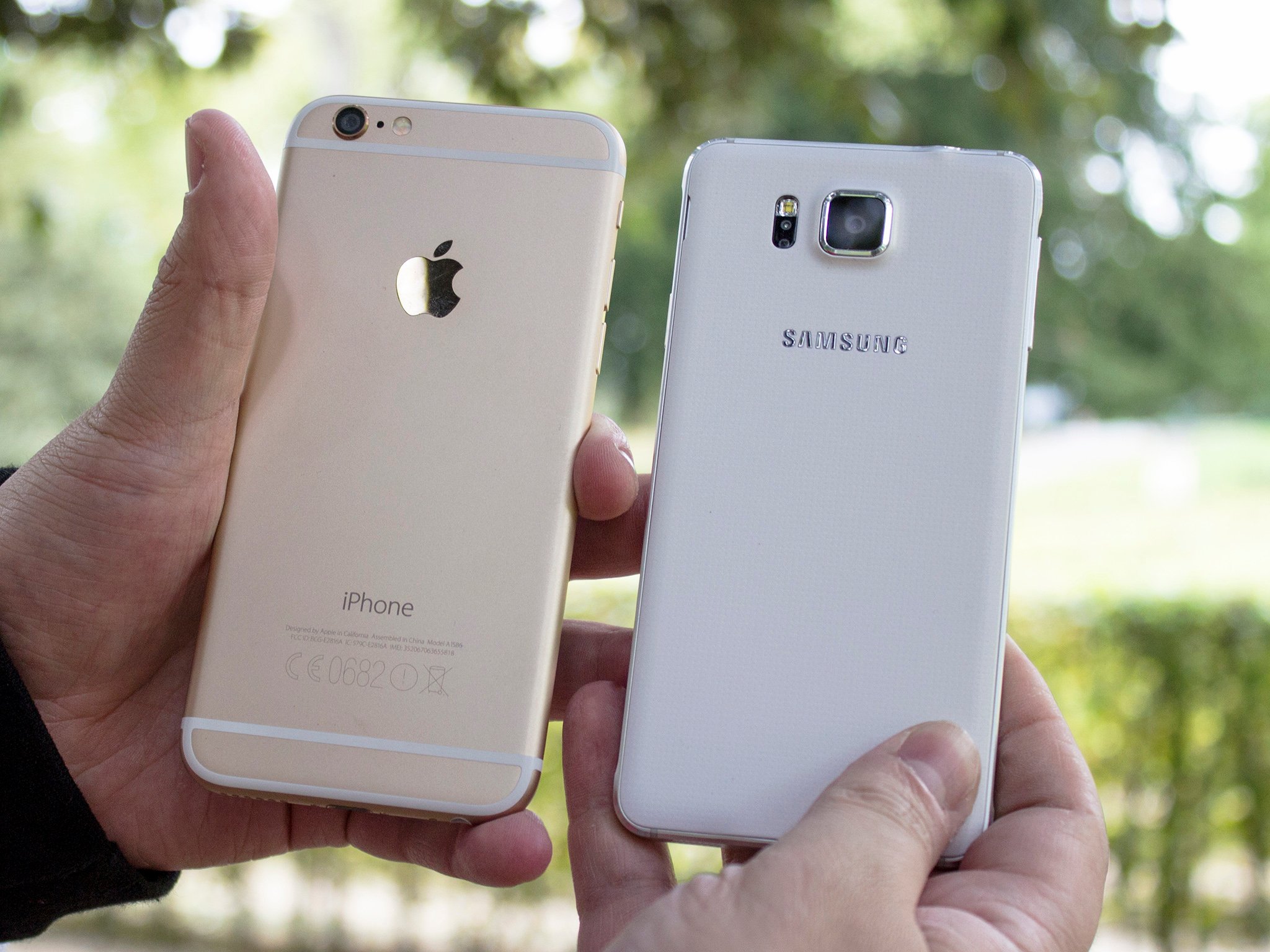
Whatever your personal feelings about Apple, the iPhone or iOS in general, the iPhone 6 is one of the top smartphones that money can buy today. A lot of people all over the world are going to buy it and be very, very happy with it. In 6 months time we're likely to see the next Galaxy S release that will undoubtedly challenge Apple on sheer sales. But there's already a perfectly capable alternative right here.
The Galaxy Alpha isn't the highest spec'd, ultimate piece of hardware that some of the nerdier among us would dream of. Indeed, it falls short of the iPhone, too, on some of the hardware, most notably the display. But what Samsung has produced is a real, viable alternative for someone who is going into a store and looking at the iPhone 6. It has that "premium" design and build, it's actually more compact — and remember, Apple makes a bigger deal of one-handed use than anyone else — and it has the might of the Android ecosystem behind it.
It's also going to cost less, which is probably more important for average joe public. Sure, it's got only one storage size option — a size Apple no longer offers, at that — yet is priced lower than the cheapest iPhone with half as much. If someone were to ask, "why wouldn't I get this Samsung Galaxy Alpha instead of the iPhone," is there really a compelling argument against it? Probably not. There are pros and cons for each, the iPhone camera and display are better all round than the Alpha, but Samsung has an edge on price, a removable battery and a higher — if single tier — base level of internal storage and the form factor. Try them both, it's the only way you'll truly be able to choose.
More: Samsung Galaxy Alpha review | iPhone 6 video review

Put the internet to work for you.
No comments:
Post a Comment